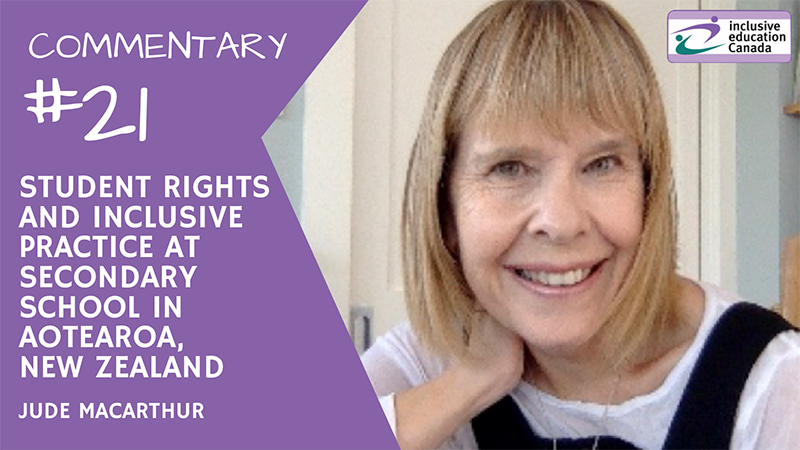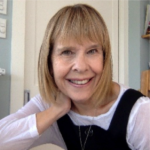 National Inclusive Education Month Commentary #21
National Inclusive Education Month Commentary #21
By Jude MacArthur, Senior Lecturer, Institute of Education, Massey University, Palmerston North, New Zealand
There has been a recent shift in thinking by the Ministry of Education in Aotearoa/New Zealand away from ideas about “special” education, to a new language and system of “learning support”. Motivated by a desire to strengthen inclusion in schools, the change in language recognises that words such as “special education” and “special needs” can create barriers for children and young people at school and in the community. Changes in the way supports are provided to students at school accompany this new language, with the Ministry acknowledging that the previous “special education” system had too many hurdles for students to get to the right support in a timely manner (Ministry of Education, 2018). The changes come hard on the heels of human rights work by IHC, an organisation that advocates for people with intellectual disabilities. IHC has a long running legal case against the New Zealand government, which IHC believes is breaking international human rights laws by not offering a free and inclusive education to everyone. The claim argues that funding and systemic failures mean that children with disabilities have continued to experience discrimination at their local school, they are treated differently to non-disabled children in matters to do with enrolment, access to the curriculum and participation in school life (IHC, 2018).
Throwing the light on human rights in this way can help us to think about what inclusive education means in the day-to-day life of a school. In her 2016 book, Children’s Rights, Towards Social Justice, the late Emeritus Professor Anne Smith from Otago University explained that she was motivated to research and write about children’s rights under the United Nations Convention on the Rights of the Child (UNCRC) because inequities can be challenged, and children can have a better quality of life. A rights-based approach can lead to developments in policy and practice that can change children’s lives for the better. Children spend most of their life in school, it is a place that has a major impact on their lives in the present and in the future, and on their life chances, yet Anne notes that measures to safeguard children’s rights at school are not very common. The idea of children even having rights at school is viewed by some as controversial, consequently inequities have arisen for some children and young people, including, for example, stand-downs and exclusions, and discrimination.
Participation rights (Article 12 of the UNCRC) are about children’s rights to express their views on school and to have those views given due weight. To what extent do schools really listen to the views of children and respond to those views in active ways that will improve their lives? A rights based approach prioritises children’s and young people’s experiences and perspectives and asks us to take notice of these as adults – as Anne Smith says, children and their voice can no longer be ignored, devalued or marginalised on the assumption that decision makers (whether they be parents, teachers, doctors, institutions, judges….) will automatically know what is in their best interests. To really improve things for students, a positive approach from the outset is clearly preferable. Inequities are much less likely to occur when schools uphold children’s rights and develop an inclusive culture of care and respect for all students. When children have the opportunity to contribute, a positive school climate can develop where children’s views are heard and respected, and most importantly, acted upon. Irish researcher, Laura Lundy (2007) has emphasised, though, that “voice is not enough”, and that children need opportunities and supports to have a say; there also needs to be an audience that is listening to their views (their teachers); and there must be some positive influence and change in the classroom and wider school as a result.
At the time of writing this commentary, I am working with Dr Vijaya Dharan at Massey University and Dr. Gill Rutherford at Otago University on a children’s rights based research project in two secondary schools that aims to enhance the school experiences of students who receive learning support. Researchers and teachers will work together in a community of practice, using the Index for Inclusion (Booth & Ainscow, 2016) to develop teaching practices that value student diversity; ensure students are fully participating; and reduce barriers to learning. Using Article 12 of the UNCRC as our reference point, we began by asking the students themselves what school is like for them. They told us that the following help them to learn well:
- friendships are very important and working in groups with peers who know “how I learn” is highly valued – this was considered important at secondary level where teachers change often;
- getting on well with teachers helps students to learn, they value an environment where asking questions is encouraged and where teachers are “not serious all the time”;
- students want to take subjects they feel they are “good at”;
- learning is easier when explanations are clear and where students can see the relevance of the content to their own lives;
- when learning is difficult, students value teachers who respond quickly and take time to explain.
Students also talked about some of the barriers to their learning, including:
- struggling with a sense of belonging, “It’s not my place”;
- challenges in understanding some information;
- being aware of the pressures of time on teachers and acknowledging “the other 30 kids in the room”, but finding it hard when they have to wait a long time for teacher support, or when the teacher is “grumpy” and you feel you have to “just go and do it!”;
- becoming disengaged when they are unable to access help in a timely manner;
- worrying about asking questions;
- bullying as a barrier to learning, with students asking for “respect” and effective teacher intervention.
The next step is for researchers and teachers to work together to build on what the students have said works best for them, and to implement some responsive teaching approaches in the classroom. Students’ feedback will be sought on the changes that have taken place in class as we use an action research cycle to make further adjustments to teaching practice. We hope that in prioritising students’ rights under Article 12, the project will assist the schools as they develop towards their goal to be inclusive communities for all.
References:
Booth, T. & Ainscow, M. (2016). The Index for Inclusion. Bristol, UK: CSIE. http://www.csie.org.uk/resources/inclusion-index-explained.shtml
IHC (2018). IHC’s Education Complaint. Retrieved on 2 February, 2018 from https://ihc.org.nz/ihcs-education-complaint
Lundy, L. (2007). ‘Voice’ is not enough. Conceptualising Article 12 of the United Nations Convention on the Rights of the Child. British Educational Research Journal, 33 (6), 927-942.
Minstry of Education (2018). Learning support (previously Special Education) update. Retrieved on 2 February, 2018 from https://www.education.govt.nz/ministry-of-education/specific-initiatives/learning-support/
Smith, A. (2016). Children’s Rights: Towards social justice. New York: Momentum Press.
 Jude MacArthur is a Senior Lecturer in the Institute of Education at Massey University, Palmerston North, New Zealand.
Jude MacArthur is a Senior Lecturer in the Institute of Education at Massey University, Palmerston North, New Zealand.
